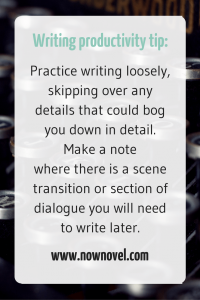Many aspiring authors have to learn how to find time to write with a full-time job. Being a stay-at-home parent also involves roles and responsibilities that can make writing time scarce. Read 9 tips for making time to write despite other tasks and distractions and getting more words on the page:
1: Plan your writing sessions in smaller units
2: Take public transport (if possible) and spend the commute writing
3: Leave lesser story details for later
4: Cut back on TV and other time-consuming entertainment
5: Have a daily plan so you work smarter
6: Use a voice recorder to dictate your story when you can’t use a pen or word processor
7: Limit your distractions from writing
8: Leave time between tasks so you have time to refocus
9: Give yourself consistent, regular writing time over weekends
Let’s expand on each of these points:
1: Plan your writing sessions in smaller units
How do you find time to write when your day is already jam-packed with inescapable tasks? To begin, plan your writing sessions in smaller units.
Reaching a daily word count of 1667 (the count required to write a 50, 000 word novel during NaNoWriMo) is hard. Yet scheduling four short sessions where you draft 417 words per day will achieve the same objective.
Write 417 words while on hold for customer service or dictate this segment of your novel into your phone’s voice recorder. Do this while performing another task such as watering the garden or stirring pots for dinner. (Cohabitants will learn to ignore your constantly talking to yourself.) Find other stolen moments – they will all add up.
2: Take public transport (if possible) and spend the commute writing
If you’re wondering how to find time to write when you study or work a full-time job, and you spend half an hour or more every day driving, try taking public transport instead. Carry a notebook and draft or create character sketches. This is a good way to take care of the latter, especially, as overheard snippets of conversation and strangers on the train or bus might jog character inspiration.
3: Leave lesser story details for later
If your time to write is limited, and you don’t have hours available to write daily, you can still zip through a first draft. Practice writing loosely, skipping over any details that could bog you down in detail. Make a note where there is a scene transition or section of dialogue you will need to write later.
For example, in the middle of a scene, there might be a confrontation between characters where you already know the outcome. If you want to carry on setting the structure and action of the scene down, you can just write:
‘[They confront each other. H is adamant that S should quit his job because he complains incessantly about it. S says H is being unsupportive.]’
Learning to skip over parts of your story to keep momentum while drafting is a useful skill. This will help you complete larger sections of your novel in briefer writing sessions.
4: Cut back on TV and other time-consuming entertainment
If you’re serious about writing a book from start to finish, you might need to make some hard choices. Instead of watching TV nightly, for example, save up your favourite series to watch as a reward when you reach milestones in your writing.
Cut down on extra recreational activities in moderation, however. Make sure you take adequate breaks so you can return to writing with a clear mind. Work writing as well as breaks into your writing schedule, so that you include ‘off’ time along with ‘on’ time.
5: Have a daily plan so you work smarter
Finding time to write is trickier when you’re shooting from the hip. To hit your writing targets, you need a daily plan because a plan helps you work with laser focus. You’ll spend less time deciding what to work on each time you sit down to write, or trying to work out the mechanics of your story.
Divide your story outline between days in your writing schedule. Set down what chapters and scenes you will write on specific days. Also track your productivity: write down, at the end of every writing session, the number of words you wrote in your writing calendar and the time of day. You might find that some days and times are more productive. Extend your sessions if possible on these days to get more out of them.
6: Use a voice recorder to dictate your story when you can’t use a pen or word processor
Finding time to write when there are many existing demands on your time means being creative. As suggested in the first tip above, use a voice recorder when you aren’t able to sit down and write. Storytelling, after all, has its roots in oral culture. Narrating tales to others out loud is in our bones.
An advantage of this strategy is that the ear doesn’t lie when it comes to finding a good turn of phrase. You can use voice-to-text software to turn your dictated story into a usable section of your novel.
7: Limit your distractions from writing
When you have reduced time to write, it’s especially important to limit distractions. You can get browser extensions that block specific distracting websites for a specified period of time so that you aren’t tempted to browse social media when you should be writing.
Try to remove distractions from your writing environment too. If the area where you tend to write is noisy, invest in decent headphones or even ear muffs – do whatever necessary to create the serenity that will allow you to think and create undisturbed.
8: Leave time between tasks so you have time to refocus
If your day is packed full with activities and you have to squeeze in a stolen writing session here and there, remember to leave time between tasks. If you launch straight into writing after you get home from work every day, you might get burnout quickly. Instead, take a few minutes to unwind. Do something you find clears your head, be it meditating, walking a pet or listening to a favourite piece of music.
Take time to refocus, especially after mentally taxing activity, as you will clear your mental slate of unnecessary clutter and be more productive.
9: Give yourself consistent, regular writing time over weekends
If you work a full-time job, finding time to write might be restricted somewhat to weekends. You could still get some writing done on your daily commute on weekdays or by setting your alarm just 20 minutes earlier and writing for 15 minutes first thing every morning.
On weekends, make the most of time off and schedule solid blocks of writing time. Think of writing as your recreational reward, even if it does feel equal parts relaxation and work. If you like to stay up late on a Friday night simply because you can, try adjust your routine and get to bed early so you can write without distraction in the early hours of Saturday morning.
This article reminds us that creative activity is highest during and immediately after sleep. So write in the morning if possible and keep research and editing for later in the day when your brain is fatigued.
It’s easier to find time to write when you’ve made a commitment to your novel and have a structured, organised process. Join Now Novel and use our tools to start writing a book or connect with other writers for mutual feedback and support.




7 replies on “How to find time to write: 9 tips to get words down”
[…] How to find time to write when you work […]
These are great tips!
Thank you, Charlotte!
[…] Now Novel: How to find time to write: 9 tips to get words down […]
I also think those are great tips!
Thank you for the kind feedback, Florence, and for reading our blog.
[…] Click here for more tips on writing time. […]